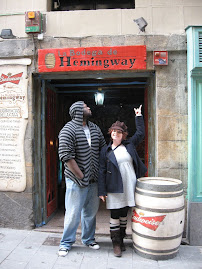I think this chapter from Burke's Language as Symbolic Action will prove very useful in my dissertation--
"Man is the symbol-using animal" (3). "'reality' has been built up for us through nothing but our symbol systems" (5).
"What is our 'reality' [...] but all this clutter of symbols about the past combined with whatever things we know mainly through maps, magazines, newspapers, and the like about the present?" (Burke 5). I think Burke's focus on terministic screens and the representation of reality fits well, more so than say Foucault, with my interests in media representations of autism as means of identifying autism.
"we like to forget the kind of relation that really prevails between the verbal and the nonverbal. In being a link between us and the nonverbal, words are by the same token a screen separating us from the nonverbal [...] since so much of the 'we' that is separated from the nonverbal by the verbal would not even exist were it not for the verbal" (Burke 5).
"Language referring to the realm of the nonverbal is necessarily talk about things in terms of what they are not--and in this sense we start out beset by a paradox. Such language is but a set of labels, signs for helping us find our way about" (Burke 5).
"'ideology' is imposed upon people" (Burke 6).
Humans are a "symbol-using, symbol-making, and symbol-misusing animal" (Burke 6). I'm wondering how Burke's distinction between "symbol-making" and rationalization plays into intellectual disabilities. I'm thinking of my Terri Schiavo paper and that she was considered less-than-human because she wasn't appearing to others to be using or making symbols. For autism, how much of the stigma against those with intellectual disabilities--even the struggle to accept and understand--is based on the fact that people believe that the autistic are not able to use or make symbols. Notice that Burke distinction between "man" and "animals" lies in the difference between being able to use and make symbols (man) and not (animal).
"symbolism" form of "substitution" (Burke 7). "substitution is a quite rational resource of symbolism" (Burke 7).
"symbolism"--"condensation," "displacement"
"cult of the scapegoat"--need to revisit this in earlier work for discussion in dissertation
Humans are the "inventor of the negative" (Burke 9).
"To look for negatives in nature would be [...] absurd" (Burke 9). "The negative is a function peculiar to symbol systems" (9). Negative is reflection of "unfulfilled expectations" (Burke 9). I underlined these passages when reading b/c I believe they fit well with discussions on disability. "Negative"--disability, "Positivism"--normal, well human with functions and abilities recognized and observable. Especially in regard to intellectual disabilities, conversations present those as "less than human," not the child that parents expected.
"the negative is but a principle, an idea, not a name for a thing" (Burke 10).
From Rhetoric of Religion--would tie in nicely with Suprahuman section: "Action involves character, which involves choice--and the form of choice attains its perfection in the distinction between Yes and No [...]. Though the concept of sheer motion is non-ethical, action implies the ethical, the human personality. Hence the obvious close connection between the ethical and negativity" (qtd in "Definition of Man" 11).
Humans: "Separated from his natural condition by instruments of his own making" (Burke 13).
"define man as the 'tool-using animal'" (Burke 13). "development of tools requires a kinds of attention not possible without symbolic means of conceptualization" (14). "Animals do not use words about words" (14).
"If we defined man first of all as the tool-using animal (or, old style, as homo faber rather than as homo sapiens), our definition would not be taking into account the 'priority' of its very own nature as a definition. Inasmuch as definition is a symbolic act, it must begin by explicitly recognizing its formal grounding in the principle of definition as an act. In choosing any definition at all, one implicitly represents man as the kind of animal that is capable of definition" (Burke 14).
"The instrumental value of language certainly accounts for much of its development, and this instrumental value of language may even have been responsible for the survival of language itself" (emphasis mine, Burke 15). I noted "instrumental" as "purposeful, pragmatic, and functional--a point relevant to autism and nonverbal autistics unable to use language pragmatically, purposefully. Or, at least some think that. I would argue that "nonverbal" is a loaded term--one that I would need to discuss in my dissertation. Because we assume that because someone is "nonverbal" that they aren't able to use symbols like NT's would. However, "nonverbal" means not speaking, but not nonsymbol using. Still, there's the assumption that thought is only able to be expressed verbally or with a formal language system. But, autistics use symbols to convey needs. This discussion on the semiotics of language is something that scholars of language and communication can contribute to the conversation. So much of autism-related discourses involve empirically-derived research; however, the Humanities can add to the discussion by examining the stigmas and associations made between symbols and those who use those symbols.
"Language is a species of action, symbolic action--and its nature is such that it can be used as a tool" (Burke 15).
Humans: "Goaded by the spirit of hierarchy" (Burke 15).
"The principle of perfection is central to the nature of language as motive. The mere desire to name something by its 'proper' name, or to speak a language in its distinctive ways is intrinsically 'perfectionist.' What is more 'perfectionist' in essence than the impulse, when one is in dire need of something, to so state this need that one in effect 'defines' the situation?" (Burke 16).
Aristotelian concept of "entelechy": "that each being aims at the perfection natural to its kind" (Burke 17).
"inasmuch as substitution is a prime resource of symbol systems, the conditions are set for catharsis by scapegoat (including the 'natural' invitation to 'project' upon the enemy any troublesome traits of our own that we would negate). And the unresolved problems of 'pride' that are intrinsic to privilege also bring the motive of hierarchy to bear here; for many kinds of guilt, resentment, and fear tend to cluster about the hierarchal psychosis, with its corresponding search for a sacrificial principle such as can become embodied in a political scapegoat" (Burke 19).
Tuesday, July 17, 2007
Subscribe to:
Post Comments (Atom)








No comments:
Post a Comment